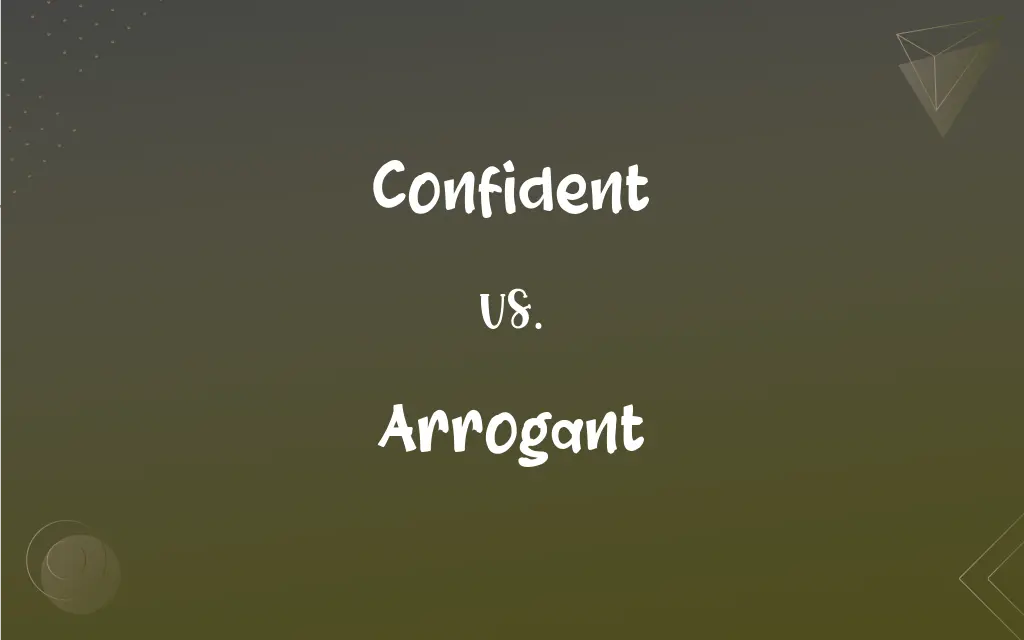Confident vs. Arrogant: What's the Difference?
Edited by Aimie Carlson || By Janet White || Published on November 22, 2023
Confident individuals believe in their abilities, while Arrogant ones consider themselves superior to others.

Key Differences
Confident individuals have a strong sense of self-assurance based on their skills, knowledge, or experience. They are aware of their strengths and capacities but remain humble in their interactions.
Arrogant individuals, on the other hand, not only believe in their capabilities but also think they are better than others. This sense of superiority often manifests in a dismissive or condescending attitude towards others.
For instance, a Confident person might share an idea believing it has merit, based on their understanding or experience. They would, however, be open to feedback and willing to adapt if necessary.
In contrast, an Arrogant person would insist that their idea is the best, often disregarding the opinions of others or belittling those who disagree. Their belief in their infallibility can make them appear boastful or egotistical.
In essence, while both Confident and Arrogant individuals trust in their abilities, their approach to others and their willingness to learn and adapt is what truly sets them apart.
ADVERTISEMENT
Comparison Chart
Self-view
Belief in personal abilities
Belief in personal superiority
Treatment of Others
Respectful and open-minded
Often dismissive or condescending
Reaction to Feedback
Open to it and willing to adapt
May reject or belittle it
Learning Attitude
Open to new information and growth
May believe they already know best
Root Cause
Comes from genuine self-assurance and experience
Often stems from insecurity or need for dominance
ADVERTISEMENT
Confident and Arrogant Definitions
Confident
Certain about the truth or occurrence of an event.
I'm Confident that the team will win the championship.
Arrogant
Having an exaggerated sense of one's own importance.
His Arrogant attitude made it difficult for colleagues to work with him.
Confident
Feeling or displaying certainty in an outcome.
With that strategy, they were Confident of success.
Arrogant
Overbearingly assuming in demeanor or conduct.
His Arrogant tone was off-putting to many.
Confident
Having firm trust in oneself.
She was Confident in her decision to start a new business.
Arrogant
Displaying a feeling of superiority over others.
The Arrogant student belittled his peers' efforts.
Confident
Displaying self-assurance in abilities or qualities.
His Confident speech captivated the audience.
Arrogant
Lacking humility, often deriving from a sense of entitlement.
She was so Arrogant that she refused to listen to advice.
Confident
Feeling or showing certainty, as of success
Was confident that the venture would be profitable.
Arrogant
Acting as if one is more deserving than others.
The celebrity's Arrogant demands irritated the event organizers.
Confident
Feeling or showing confidence in oneself; self-assured
A confident driver.
Arrogant
Having or displaying excessive pride in oneself or an excessive sense of self-importance.
Confident
(Obsolete) Confiding; trustful.
Arrogant
Marked by or arising from a feeling or assumption of one's superiority over others
An arrogant contempt for the weak.
Confident
Very sure of something; positive.
I'm pretty confident that she's not lying, she's acting normally.
He was confident of success.
Arrogant
Having excessive pride in oneself, often with contempt or disrespect for others.
Confident
Self-assured, self-reliant, sure of oneself.
Arrogant
Making, or having the disposition to make, exorbitant claims of rank or estimation; giving one's self an undue degree of importance; assuming; haughty; - applied to persons.
Arrogant Winchester, that haughty prelate.
Confident
Forward, impudent.
Arrogant
Containing arrogance; marked with arrogance; proceeding from undue claims or self-importance; - applied to things; as, arrogant pretensions or behavior.
Confident
Obsolete form of confidant
Arrogant
Having or showing feelings of unwarranted importance out of overbearing pride;
An arrogant official
Arrogant claims
Chesty as a peacock
Confident
See Confidant.
Confident
Having or marked by confidence or assurance;
A confident speaker
A confident reply
His manner is more confident these days
Confident of fulfillment
Confident
Persuaded of; very sure;
Were convinced that it would be to their advantage to join
I am positive he is lying
Was confident he would win
Confident
Not liable to error in judgment or action;
Most surefooted of the statesmen who dealt with the depression
Demonstrates a surefooted storytelling talent
Confident
Exuding a sense of comfort in one's own skin.
Her Confident demeanor made her stand out in the crowd.
FAQs
Is it possible to be Confident without appearing Arrogant?
Absolutely. Being Confident involves self-belief, while being Arrogant involves superiority over others.
How can one build genuine confidence?
By gaining knowledge, honing skills, seeking feedback, and affirming one's achievements without diminishing others.
Do people often mistake Confident individuals for being Arrogant?
It can happen, especially if one's confidence is misinterpreted or if it's displayed too assertively.
Is being Confident a positive trait?
Yes, being Confident is generally viewed as a positive trait, reflecting self-assurance.
Is arrogance always a negative trait?
While there can be situational benefits, Arrogant behavior is generally viewed negatively in interpersonal relationships.
Can Arrogant leaders be effective?
While some Arrogant leaders may achieve results, they might struggle with team cohesion and loyalty in the long run.
Does being Confident boost one's resilience?
Yes, Confident individuals often have an increased capacity to handle challenges and rebound from setbacks.
Can Arrogant individuals be unaware of their arrogance?
It's possible. Some Arrogant individuals may not realize how their behavior affects others.
Is it essential for leaders to be Confident?
Being Confident can benefit leaders, as it helps in decision-making and inspires trust among followers.
Can Arrogant behavior stem from insecurity?
Yes, sometimes Arrogant behavior can be a defense mechanism stemming from underlying insecurity.
Can a Confident person have moments of doubt?
Yes, even Confident individuals can have moments of doubt or uncertainty.
Are Confident people always extroverted?
No, confidence isn't limited to extroverts. Introverted individuals can be just as Confident in their way.
Can confidence be learned?
Yes, confidence can be cultivated through experiences, knowledge acquisition, and positive reinforcement.
Is Arrogant behavior ever beneficial?
In some situations, appearing Arrogant might deter opposition or challenge, but the long-term relational costs might outweigh the benefits.
Why is Arrogant behavior often off-putting to others?
Arrogant behavior can be seen as dismissive, making others feel undervalued or disrespected.
Can self-awareness help in differentiating between being Confident and Arrogant?
Yes, self-awareness helps individuals gauge how their behavior might be perceived by others.
How can one respond to Arrogant behavior in others?
By maintaining composure, setting boundaries, and addressing concerns constructively.
Why do some people gravitate towards Arrogant individuals?
Some might see Arrogant behavior as a sign of strength, certainty, or leadership, even if it's a façade.
Can positive affirmations help build confidence?
Yes, positive affirmations can reinforce self-belief and contribute to a Confident mindset.
Can Arrogant individuals be sensitive to criticism?
Often, Arrogant individuals might be particularly sensitive to criticism, seeing it as a challenge to their self-perception.
About Author
Written by
Janet WhiteJanet White has been an esteemed writer and blogger for Difference Wiki. Holding a Master's degree in Science and Medical Journalism from the prestigious Boston University, she has consistently demonstrated her expertise and passion for her field. When she's not immersed in her work, Janet relishes her time exercising, delving into a good book, and cherishing moments with friends and family.
Edited by
Aimie CarlsonAimie Carlson, holding a master's degree in English literature, is a fervent English language enthusiast. She lends her writing talents to Difference Wiki, a prominent website that specializes in comparisons, offering readers insightful analyses that both captivate and inform.






































































